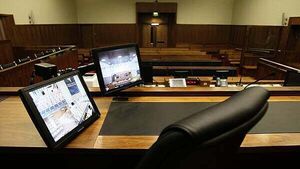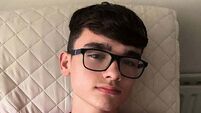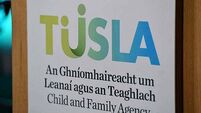Boy (4) was 'kept out of sight' before being shaken to death, court hears

Eoin Reynolds
A four-year-old boy was "kept out of sight" from his family to hide bruising on his face following a series of assaults before he died having been shaken by his step-mother, a barrister has told a murder trial at the Central Criminal Court.
In her opening speech on Wednesday, Anne Rowland SC, for the Director of Public Prosecutions, said the accused, a woman in her 30s from the southwest of the country, told gardaí that the boy was a "bold cheeky child" and often had to be grounded.
She described keeping the boy in his room in the days prior to his death, where he had to sit on the floor and was only allowed out to go to the bathroom or for emergencies.
She told gardaí on the day the boy suffered his fatal injuries, she "snapped" and recalled "shaking him and screaming at him to behave" before he fell on the floor.
Ms Rowland said that on March 13th 2021, the child's father called emergency services, saying the boy had fallen from his bunk bed.
An emergency crew found the boy sitting on his bedroom floor, unconscious.
Suspicions were raised, counsel said, when doctors and emergency personnel noticed multiple bruises of different colours to the child's face, chest, arms and legs.
Brain injury
Ms Rowland said the prosecution intends to prove that there was a series of assaults on the boy that escalated on March 13.
She said a pathologist will say that the brain injury the boy suffered was not caused by a fall from a bunk bed but by shaking combined with contact with a flat surface.
The court also heard that on the morning when emergency services were called, the accused Googled: "Why is it bad if you bang your head and go to sleep?"
The accused cannot be identified to protect the identity of a child witness in the trial. She has pleaded not guilty to murder but guilty to the boy's manslaughter.
Ms Rowland told the jury that the deceased's mother and father had been in a relationship for some years, but had split up and begun new relationships.
The deceased's father began a relationship with the accused, and they moved in together.
By late 2020, the deceased's mother was suffering mental health issues, so she allowed the boy to live with his father and the accused woman in their three-bedroom house.
Bunk bed fall
At 12.46 pm on March 13th 2021, Ms Rowland said the child's father called 999 and said his son had fallen from the top bunk in his bedroom and was unconscious.
An ambulance arrived shortly after 1 pm and found the boy in the foetal position, lying unconscious on the floor, counsel said. His head was on a pillow, but he had no blankets.
Ms Rowland said the emergency services crew were immediately concerned that the boy had different coloured bruises, which suggested they had been caused at different times.
They brought him to a nearby hospital where doctors noticed the boy had a black eye, bruising on his face and arms, and he remained unconscious.
A CT scan revealed bleeds in two parts of the brain, his pupils were fixed, and an assessment on the Glasgow Coma Scale showed that he was "not conscious at all", counsel said.
A doctor who assessed him will tell the trial she did not believe the internal brain injuries she saw could have been caused by a fall from a bunk bed.
Specialists in Temple Street were consulted and said the child would ideally be brought in for surgery, but, having looked at the scans, they didn't believe he would survive the journey. He was taken to another hospital where doctors carried out a craniotomy, but he did not revive.
Doctors decided that nothing could be done for the child, but that there was better end-of-life care at Temple St, so he was taken there by ambulance.
He spent a few hours with his grandparents before doctors turned off the life support machines. He took just 15 minutes to die, Ms Rowland said.
State Pathologist Dr Heidi Okkers will tell the trial that the boy died due to a traumatic head injury in association with blunt force trauma to the stomach, Ms Rowland said. The blunt force injury to the abdomen, she said, caused a laceration to the boy's liver.
Dr Okkers will also tell the trial that the brain injury was not caused by a simple fall, but from shaking combined with contact with a flat surface.
The accused woman spoke to gardaí after the child's injuries first came to light, Ms Rowland said.
She told gardaí that he was a "bold, cheeky child" who would be put on the bold step. For the previous month, she said his behaviour had become worse and he was often grounded or sent to his room.
On March 9th, she said he had been grounded and not allowed downstairs. When grounded, the accused told gardai the boy was not allowed to leave his room and could not sit on his bed, but had to sit on the floor. He would only be allowed out to go to the toilet or for emergencies.
He remained grounded in his room for the following three days, even though there were two different family celebrations with other family members visiting over those days, Ms Rowland said.
On the morning when emergency services were called, the accused told gardai that the boy's father went to work. The boy was sitting on the floor of his bedroom, but after 12 pm, when the boy's father arrived home, she said they heard a bang.
When they went upstairs, she said the boy was lying on the floor, so they called an ambulance.
Gardaí examined mobile phones and CCTV footage from a neighbour's home, which showed the movements of people up and down the stairs in the child's home.
The CCTV, Ms Rowland said, showed the accused going up and down the stairs every ten to 15 minutes that morning until 10.50 when she entered a Google search on her phone stating: "Why is it bad if you bang your head and go to sleep?"
There were a number of calls and texts with the boy's father, and at 11.06, the accused searched for 'concussion' on Google. From then, the accused went up and down the stairs every two minutes, Ms Rowland said, until the boy's father arrived home at 12.35 pm.
During that time, she texted the boy's father saying: "Why did you leave?", "I need you home", and "you shouldn't have left, and you know that."
Eight minutes after the boy's father arrived home, he called emergency services.
The boy's uncle would later tell gardai that he was supposed to do a video call every Sunday with his nephew, but on most occasions, he was told that he couldn't talk to the boy because he had been 'bold'.
The accused's mother told gardaí that on February 23rd, she noticed a bruise on the child's face.
A friend of the accused told gardaí that on another occasion she brought chocolate eggs for the child, but was told that he was upstairs because he had been bold.
The accused refused to let her bring the chocolate to the child. A few days later, the friend visited again and noticed that the boy still had not received the chocolate egg.
A teenage boy who visited the home will tell the trial that he saw the accused slap the boy and put him to bed after he refused to eat his dinner.
On another occasion, the same teenager will say he saw the accused slap the boy and "drag him upstairs".
The accused was arrested again in September 2021 and said that on the morning of the 13th of March, she didn't want her partner to go to work because she "didn't want to be alone with [the child] in case anyone called and saw the bruising on his face."
Later that morning, she said she "snapped" and recalled "shaking him and screaming at him to behave". She said she blanked out and didn't remember if she hit the boy, but he fell on the ground, and she walked out.
In a later interview, she said she had been arguing that morning with the child's father about the injuries to the boy's face. After the father left, she went upstairs where the boy was sitting on the floor. She said she asked him why he couldn't behave and started shaking him.
She said she was "nearly sure his two feet were off the floor and he fell".
Ms Rowland said the prosecution's case is that there were various assaults on the child prior to March 13th.
She said the jury will be able to infer that the reason the boy was "kept out of sight" of other family members for several days was because of the "obvious bruising".
Ms Rowland said the assaults escalated to a kick on March 12th and further injuries were inflicted the following day, leading to the boy's death. Ms Rowland said the accused "could only have intended at a minimum to cause serious injury", the required intent for murder.
Ms Rowland further told the jury that the accused has previously pleaded guilty to two counts of assaulting the child in January 2021 and on March 5th 2021.
The trial continues in front of Mr Justice Paul McDermott and a jury of four women and eight men.





